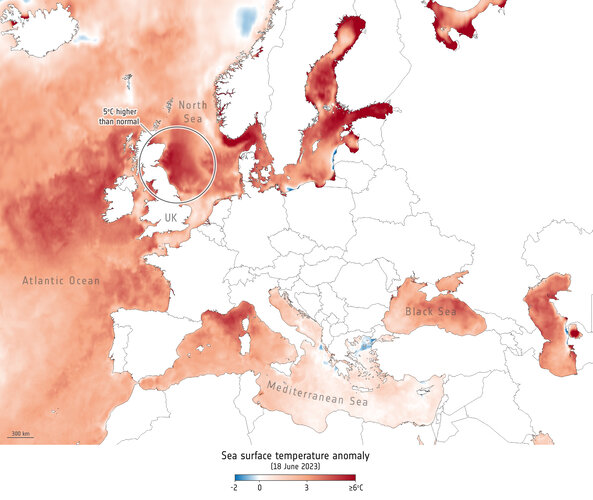Some of the most severe marine heat increases on Earth are occurring in the seas surrounding the UK and Ireland. Satellite measurements show that water temperatures in certain areas are above average for this time of year.
The coastal regions off the east coast of the UK, from Durham to Aberdeen, and off the northwest coast of Ireland are particularly warm. The map shows sea surface temperatures on 18 June 2023, compared with the long-term (1981-2016) average.
Satellite data show the sea surface temperature in the North Sea is more than 5°C higher than the average during this time of year. Temperatures anomalies are also extreme in the Baltic with temperatures more than 8°C above average.
Craig Donlon, Head of Earth Surfaces and Interior Section at ESA, explains that the current marine heatwave is classified as an extreme Category IV/V Marine Heatwave – extremely unusual for this time of year.
Marine heatwaves occur due to a combination of atmospheric and oceanographic processes. The sustained high temperatures could trigger mass mortality of fish and other marine life. Also, marine heatwaves are linked to more extreme weather events – making them more intense and longer lasting.
The warming of the seas around the UK coincides with a global trend of rising air and ocean surface temperatures in recent months. According to data from the Met Office dating back to 1850, both April and May 2023 witnessed the highest-ever recorded global sea surface temperatures.
These elevated temperatures have been associated with a series of extreme heat events worldwide, contributing to record-breaking wildfires in Canada, heatwaves in China and Siberia, and reduced sea ice extent in the Antarctic.
June 2023 is also on course to hit record heat levels. According to the Copernicus Climate Change Service, the first 11 days of June were the hottest ever recorded worldwide for this time of year. This is the first time that global air temperatures have exceeded pre-industrial levels by more than 1.5°C during the month of June.
Although the current high temperatures are expected to be temporary, experts anticipate more temperature records to be broken in the coming months due to the projected warming of the Pacific Ocean associated with the development of an El Niño event. Scientists already predict that 2024 may become the hottest year on record.
Craig Donlon says, “Extreme Marine Heatwaves are not an everyday event in UK waters. Satellite data, together with data on the ground, will allow us to document the impact of this marine heatwave including stress on the marine ecosystem, the impact on industries such as aquaculture and fisheries, modification of local wind patterns and potential rainfall events that may emerge later.”
“What is important to realise is that significant warming is also evident over the Tropical Pacific as part of the current El Niño system accompanied by widespread surface ocean warming in the Pacific and Atlantic Ocean.
“This is a really startling global situation because the additional surface heating we see at this time will eventually be mixed into the ocean water column. Some of this excess heat will find its way into the Arctic Ocean via ocean currents through the Fram Strait and Norwegian Sea further exacerbating the demise of Arctic sea ice. We will be monitoring in detail to see how all these aspects evolve with great interest”.



 Image:
Some of the most severe marine heat increases on Earth are occurring in the seas surrounding the UK and Ireland. Satellite measurements show that water temperatures in certain areas are above average for this time of year.
Image:
Some of the most severe marine heat increases on Earth are occurring in the seas surrounding the UK and Ireland. Satellite measurements show that water temperatures in certain areas are above average for this time of year.